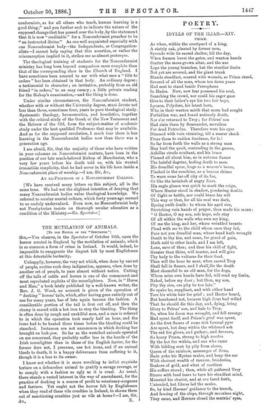THE MUTILATION OF ANIMALS.
[To THE EDITOR OP THE "SPECTATOR."]
Sfa,—You observe, in the Spectator of October 16th, upon the horror created in England by the mutilation of animals, which is so common a form of crime in Ireland. It would, indeed, be impossible to exaggerate the disgust felt by most Englishmen at this detestable barbarity.
Unhappily, however, the very act which, when done by one set of people, excites such deep indignation, appears, when done by another set of people, to pass almost without notice. Cutting off the tails of cattle and horses is one of the commonest and most reprobated exploits of the moonlighters. Now, in " Horse and Man," a book lately published by a well-known writer, the Rev. J. G. Wood, an account is given of the operation of
4g docking " horses' tails, which, after having gone entirely out of use for many years, has of late again become the fashion. A considerable portion of the tail is first cut off, and then the stump is seared with a hot iron to stop the bleeding. The thing is often done by rough and unskilful men, and a case is referred to in which the operation took nearly half an hour, and the irons had to be heated three times before the bleeding could be stanched. Instances are not uncommon in which docking has brought on lock-jaw. So far as the wretched animals operated on are concerned, they probably suffer less in the hands of the Irish moonlighter than in those of the English farrier, for the former does not, I presume, use hot irons, and if an animal bleeds to death, it is a happy deliverance from suffering to it, though it is a loss to its owner.
I know not whether it is more revolting to inflict exquisite
torture on a defenceless animal to gratify a savage revenge, or to comply with a fashion as ugly as it is cruel. As usual, -there stands a vested interest in the way of amendment, for the practice of docking is a source of profit to veterinary-surgeons and farriers. Yet ought not the horror felt by Englishmen when they read of these vile cruelties in Ireland, to shame them out of sanctioning cruelties just as vile at home P—I am, Sir,
X.




































 Previous page
Previous page